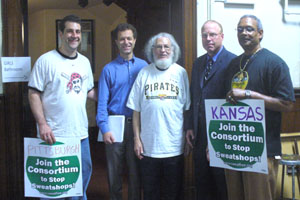Allegheny County Council: Bill would strap guidelines on trade with foreign companies
Submitted on Thu, 06/05/2008 - 12:36pm
 [Pictured at the right: July 12, 2008 – Kenneth Miller of the Pittsburgh Anti Sweatshop Community Alliance (PASCA), Bjorn Claeson, Executive Director of SweatFree Communities, Dennis Brutus of the Thomas Merton Center, Jay Lantzy, Director, Office of Labor/Management Cooperation, PA DOL represented Governor Ed Rendell, and Howard Jackson of Pittsburgh’s Black Political Empowerment Project. We gathered at a Workers Rights Board Hearing, organized by the Philadelphia Jobs with Justice, to hear worker testimony, celebrate SweatFree Communities 5th Anniversary, and join Governor Rendell’s SweatFree Consortium outreach to his colleagues during the National Governor Association meeting.]
[Pictured at the right: July 12, 2008 – Kenneth Miller of the Pittsburgh Anti Sweatshop Community Alliance (PASCA), Bjorn Claeson, Executive Director of SweatFree Communities, Dennis Brutus of the Thomas Merton Center, Jay Lantzy, Director, Office of Labor/Management Cooperation, PA DOL represented Governor Ed Rendell, and Howard Jackson of Pittsburgh’s Black Political Empowerment Project. We gathered at a Workers Rights Board Hearing, organized by the Philadelphia Jobs with Justice, to hear worker testimony, celebrate SweatFree Communities 5th Anniversary, and join Governor Rendell’s SweatFree Consortium outreach to his colleagues during the National Governor Association meeting.]
Should the Allegheny County chief executive help local businesses make connections with overseas companies -- even if those businesses may not meet Allegheny's health, labor or human-rights standards?
It's a question that county Councilor Bill Robinson is raising with a new piece of legislation.
The bill would require the county executive -- prior to making any deal that permits or requires international shipments to or through Allegheny County -- to obtain assurances that none of the cargo has "been manufactured or is intended to assist in the violation of human rights of any individual."
However, the bill would only apply to deals involving Allegheny County departments and agencies. For example, the county executive could not purchase ink pens from a Chinese company without first getting assurances that the human rights of any worker involved in its manufacturing weren't violated. However, private companies cannot be forced to adhere to the same standards.
Though the bill relies on the chief executive to determine what human-rights standard to apply -- and it states that he or she only has to receive assurances "to the extent practicable" -- the bill's primary sponsor believes that it would set guidelines for the county's role in facilitating international business.
Robinson acknowledges that he's not going to stop imports from countries like China -- where forced labor persists, according to a March 2008 U.S. State Department release. But he says county officials should think twice before encouraging more trade with the country.
In April 2007, Chief Executive Dan Onorato traveled to China with a delegation of local business leaders to promote trade and economic cooperation. Then in November 2007, the Pittsburgh International Airport and China's Xi'an Xianyang International Airport signed a letter of intent to "promote Sino-U.S. economic and trade exchanges and cooperation," through information sharing and the establishment of freight business.
In a press release, Onorato called the letter a "first and critical step in establishing air-cargo routes between Xi'an and Pittsburgh ... [and] this agreement opens the door to great opportunities for our region that could mean more jobs, commerce and development."
"What they're on the path to doing is assisting local businesses with China," Robinson says. "It doesn't make any sense to be engaging with other countries where their products don't meet our standards.
"I'm not trying to knock Dan Onorato for trying to bring business into the county," Robinson adds. "But I think we have to be careful that the service to our constituents is going to be proper."
On April 15, the bill was referred to the eight-member committee on government reform. A meeting to discuss the measure has not yet been scheduled.
Onorato says that he can't comment on the bill yet, but has sent it to the law department for review.
The bill would also require the chief executive to receive assurances that the cargo does not contain organisms or contaminants that could harm public health. Additionally, the county executive could not sign agreements allowing the county to receive cargo that was "manufactured or is intended to assist the manufacture of goods in sweatshop conditions."
One local anti-sweatshop organizer feels the bill could have a huge impact, if the county executive uses it to require overseas importers to disclose factory locations and wage information.
"That information would become public," says Kenneth Miller, co-founder of Pittsburgh Anti-Sweatshop Community Alliance. "We're then in a situation of developing testimony [through international labor organizations] to confirm or say this is untrue."
Miller -- who's been active in anti-sweatshop organizing for 15 years -- says Robinson's measure could set a national standard for local governments.
"Every point of entry [in the country] would have to look at this and they would have to compare what they've done to what this does," he says.
The bill does not call for any new inspections to be implemented and it does not detail what would happen if the chief executive received assurances of quality that turned out to be inaccurate.
 [Pictured at the right: July 11, 2008 - Dennis Brutus with the other poets who preformed at open mic. Robin’s Bookstore in Philadelphia.]
[Pictured at the right: July 11, 2008 - Dennis Brutus with the other poets who preformed at open mic. Robin’s Bookstore in Philadelphia.]
"This is a difficult and challenging subject, but that doesn't mean the county shouldn't weigh in on this," Robinson says. "The first step beyond convincing my colleagues is to find out what the intent of this administration is."